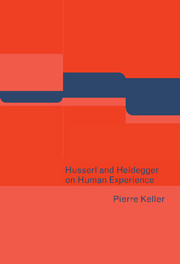Book contents
- Frontmatter
- Contents
- Introduction
- 1 Experience and intentionality
- 2 Husserl's methodologically solipsistic perspective
- 3 Husserl's theory of time-consciousness
- 4 Between Husserl, Kierkegaard, and Aristotle
- 5 Heidegger's critique of Husserl's methodological solipsism
- 6 Heidegger on the nature of significance
- 7 Temporality as the source of intelligibility
- 8 Heidegger's theory of time
- 9 Spatiality and human identity
- 10 “Dasein” and the forensic notion of a person
- Select bibliography
- Index
6 - Heidegger on the nature of significance
Published online by Cambridge University Press: 02 November 2009
- Frontmatter
- Contents
- Introduction
- 1 Experience and intentionality
- 2 Husserl's methodologically solipsistic perspective
- 3 Husserl's theory of time-consciousness
- 4 Between Husserl, Kierkegaard, and Aristotle
- 5 Heidegger's critique of Husserl's methodological solipsism
- 6 Heidegger on the nature of significance
- 7 Temporality as the source of intelligibility
- 8 Heidegger's theory of time
- 9 Spatiality and human identity
- 10 “Dasein” and the forensic notion of a person
- Select bibliography
- Index
Summary
This chapter consists of three parts. In the first part, I discuss Heidegger's analysis of language. According to this analysis of language, we are able to articulate our understanding and affectedness by our environment through language. In the second part, I turn to the way Heidegger's account of truth provides the basis for a general theory of significance (“Bedeutsamkeit”) that is, in turn, the basis for a theory of non-linguistic and linguistic meaning. Truth is the condition for the possibility of the concerns we have as human beings. These concerns structure our understanding of the world in a way that is incomprehensible independently of the spatial world in which we move as agents. Our concerns provide a holistic pattern of significance that cannot be understood in a methodologically solipsistic manner, although we must engage in a kind of existential disengagement to fully appreciate them. The pattern of significance that governs us as agents in the spatial and temporal world is, in turn, the basis for Heidegger's account of sense (“Sinn”) and meaning (“Bedeutung”).
In the third part of the chapter, I turn to a discussion of the breakdown of the holistic structure of significance that first reveals to us that very functional structure of significance. The breakdown of significance at the same time leaves a place for an account of nature that is independent of what we care about and provides a way for Heidegger to provide a revised version of Husserl's phenomenological reduction which side-steps Husserl's commitment to methodological solipsism.
- Type
- Chapter
- Information
- Husserl and Heidegger on Human Experience , pp. 132 - 155Publisher: Cambridge University PressPrint publication year: 1999

